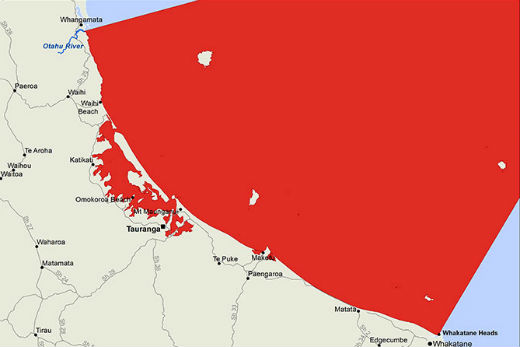Paralytic shellfish toxins in Bay of Plenty and Coromandel shellfish remain at toxic levels, says the Ministry of Primary Industries.
The latest testing of shellfish show levels of PSP are now climbing to potentially harmful levels and the MPI is advising people not to collect or eat shellfish from the affected area.
Bay of Plenty and Coromandel shellfish in this area contain toxic algae and are unsafe to eat. Image: MPI
PSP toxins have been detected in shellfish at levels over the safe limit of 0.8mg/kg which has been set by the MPI. Ongoing testing will continue and any changes will be communicated accordingly.
The affected area is from the mouth of the Otahu River at the southern end of Whangamata Beach, southwards all the way down to the Whakatane Heads.
The area includes Tauranga Harbour, Maketu and Waihi estuaries, Matakana and Motiti Islands, and all other islands along this coastline.
Shellfish affected are: Mussels, oysters, tuatua, pipi, toheroa, cockles, scallops, catseyes, kina (sea urchin) and all other bivalve shellfish. Cooking shellfish does not remove the toxin.
Pāua, crab and crayfish may still be eaten if the gut has been completely removed prior to cooking, as toxins accumulate in the gut. If the gut is not removed its contents could contaminate the meat during the cooking process.
If anyone becomes ill after eating shellfish from an area where a public health warning has been issued:
- phone Healthline for advice on 0800 61 11 16, or seek medical attention immediately
- advise your nearest public health unit
- keep any leftover shellfish in case it can be tested.
Commercially harvested shellfish – sold in shops and supermarkets, or exported – is also subject to strict water and flesh monitoring programmes by MPI to ensure they are safe to eat.
Shellfish and seawater samples are taken every week from popular shellfish gathering areas around New Zealand and are tested for the presence of toxic algae. If the shellfish are not safe to eat, then public health warnings are issued and signs are posted at affected beaches.



0 comments
Leave a Comment
You must be logged in to make a comment.